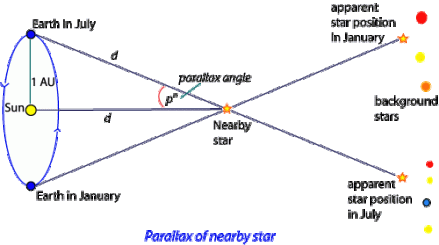J asks:
1. Could you convert the rate of expansion of the universe in everyday terms? As an automotive engineer, I am very comfortable with units of ft or miles per second squared
2. How much energy from God is infused into the universe every second in order to maintain the space energy density.
When I initially set out to answer J’s questions, I was just going to write a line or two giving the numerical answer for each one. But what fun is that? Instead, I decided to take you all down the rabbit hole with me, and get into the details of each of these questions. But if you just want to skip ahead to the answers, they’re highlighted at the end of each discussion.
Here we go…
1. First, a bit of context. In 1929, American astronomer Edwin Hubble presented evidence that galaxies are rushing away from one another, and that the speed with which they are rushing away is proportional to their redshift. This is interpreted to mean that the further away galaxies are, the faster they appear to be moving away, and this was the first physical evidence that our universe was not static and eternal, but dynamic and finite in time. The average rate at which galaxies are moving away from each other — called the Hubble constant — is a reasonable measure of the expansion rate of the universe, so we’ll use that to answer J’s question. The Hubble constant is about 70 km/s per megaparsec of space.
Now, I could just throw that number at you and convert the units to something more relatable and be done with it, but why do that when we have an opportunity to go into some nifty astronomical stuff? For instance, did you know astronomers don’t use light-years in their work? Light-years are used more for relating astronomical stuff to the general public. Instead, astronomers use parsecs, where one parsec equals 3.26 light-years. It may seem arbitrary, but there’s a sensible reason astronomers use this seemingly weird unit for distance. The answer lies in the definition of the word ‘parsec,’ which comes from ‘parallax’ and ‘arcsecond.’ Parallax is the apparent shifting of something in the foreground with respect to a very distant background. You can observe parallax by holding out your thumb and then observing it shift relative to stuff further away as you close one eye and then the other. This happens because your eyes are separated by a short distance. If you were able to adjust the distance between your eyes, you would notice more parallax the further apart you moved your eyes.
Based on the same principle, we observe parallax of nearby stars relative to much further stars as the Earth orbits around the Sun. When the Earth is on one side of the Sun, we can observe a nearby star relative to a particular background of stars. Six months later, when the Earth is on the other side of the Sun, we observe the same star relative to a different background of stars. This is rather useful in terms of measuring distances, because the further away something is, the less parallax you observe. And that leads to the definition of parsec: a parsec is the distance at which you would observe exactly 1 arcsecond of parallax as the Earth goes around the Sun.
And now I’ve introduced another term that needs to be explained. An arcsecond is a unit of angular size. When we look at objects and assess how large they are, we aren’t actually measuring linear sizes, but rather how big of an angle they subtend. The Moon in the sky, for instance, subtends a half a degree of ‘arc.’ That’s its size as far as our eyes and brains can measure it. If we have some idea of how far away it is, then our brains can translate that to a linear size. (Angular size + knowledge of distance + a bit of cogitation = “Wow, half a degree of arc and that thing is 240,000 miles away? It must be big!”) So then, what’s an arcsecond? Well, one degree of arc is divided up into 60 arcminutes, and each arcminute is divided up into 60 arcseconds. So, an arcsecond is 1/3600th of a degree, which seems awfully small until you realize that the smallest angle we can measure in astronomy is about one thousandth of that.
Let’s return to J’s question. We know the Hubble constant is about 70 km/s per megaparsec of space. Mega means million, so for every million parsecs of distance away from the Milky Way, space is observed to be expanding at a rate of 70 km/s. In more relatable terms, that translates to about 157,000 mph per 3.26 million light-years of space. More distant galaxies are seen to move faster simply because of their distance. I have my students do a little experiment to help visualize this. Take a thick rubber band, cut it and lay it out flat, and then draw some dots on it: one dot in the middle to represent the Milky Way, and then dots on the other side at various distances to represent other galaxies. As you stretch out the rubber band, the “rate” at which the other dots move from the MW dot depends on how far away they are, and the more distant ones do indeed expand faster than the closer ones.
A better way to get an idea of how fast the universe is expanding is to think of scale instead of proper distances. The scale is a rough guide to the distances between galaxies, which grows as the universe expands, but we don’t attach any units to it. Instead, we think about how long it takes the scale to double or triple or increase by a factor of 100 or whatever. Billions of years ago, when the universe was small in scale, it was doubling in scale very rapidly, but as the scale got much larger, it took longer and longer to double. The last time the universe doubled in scale, it took about 7 billion years. The next doubling will take much longer. Incidentally, this is the basis for reconciling a literal interpretation of Genesis 1 with a very old universe, as shown here. This is complicated a bit by the observation that the universe is accelerating in its expansion, and this leads to J’s next question.
Summary: The universe is expanding at a rate of about 157,000 mph per 3.26 million light-years of space.
2. Astrophysicists have proposed the existence of some mysterious, unseen form of energy in the universe to account for the speeding up of its expansion. They call this energy “dark energy,” and it has the peculiar property that its space density stays constant. Density is the amount of something per volume, so this means the amount of dark energy per volume of space never changes, even though the amount of space in the universe is increasing every moment. Think about how weird that is. That means the extra dark energy needed to keep the dark energy per volume constant as the universe expands has to come from somewhere. But where? I recently lectured about this to a group of Christians who were keen on science, and explained that this is consistent with scripture in which we are told that God sustains the universe (Heb 1:3, Col 1:17). When J heard this, he wanted to know how much energy per second God is injecting into the universe to maintain the constant dark energy density. So, let’s try to figure it out.
Even though dark energy is the dominant “stuff” of the universe, it’s extremely rarefied. It makes up 68% of the total of everything that’s in the universe, and yet its energy density is a paltry 10-9 joules for every cubic meter of space. The reason dark energy dominates the universe in spite of its low energy density is that space is HUGE — there’s an astronomical amount of cubic meters in space, so that paltry energy adds up to something big over large distances.
It turns out, we can’t answer J’s question directly, since we don’t know the total size of the universe. The universe could be finitely huge or infinitely huge; we simply don’t know. But we can estimate the amount of extra energy needed per second per megaparsec of space and use that to estimate how much extra energy is needed for the amount of the universe we can observe.
Remember that the Hubble constant, 70 km/s per megaparsec, tells us the rate of expansion. So, let’s first imagine a cubic chunk of space that’s a million parsecs on each side. Converting to more convenient units, this cosmic cube is 3.09 x 1022 meters on each side. This chunk of space is expanding at a rate of 70 km/s, which is 70,000 meters every second; this means every second, the chunk of space is gaining (3.09 x 1022 m + 70,000 m)3 – (3.09 x 1022 m)3, or 2 x 1050 cubic meters, in volume. If the space density of dark energy is 10-9 joules for every cubic meter, then each cubic megaparsec chunk of space is gaining an extra 2 x 1041 joules per second.
Let’s put that in relatable terms. One joule per second is known as a watt, a common household unit of power that you probably recognize from lightbulbs. So, let’s think of the extra energy injected into space every second in terms of watts. The Palo Verde nuclear power plant in Arizona has three reactors with a total power output of about 4,000 megawatts. If we take 2 x 1041 watts and divide by that, we get 5 x 1031 nuclear power plants-worth of power for each of these million-parsec chunks of space. That’s a 5 with 31 zeroes after it. Sounds impressive, doesn’t it? Well, consider that the size of the observable universe is much larger than this hypothetical chunk of space, about 30 gigaparsecs in any direction, which means that that the total amount of energy per second added to the observable universe is equivalent to 1045 nuclear power plants. To complicate things a bit, this is the momentary increase in energy per second of the observable universe, since the universe is expanding every moment. And, oddly, this is kind of wimpy when you consider that the theoretical prediction for the space density of dark energy is about 30 orders of magnitude higher than what’s been measured, a mismatch that so far no one knows how to resolve.
Summary: The amount of energy that’s currently added to the observable universe per second to maintain a constant space density of dark energy is the equivalent output of 5 x 1045 nuclear power plants. That’s a billion-trillion-trillion-trillion nuclear plants.
I know I skipped over some stuff that probably has you scratching your head, like the idea that some mysterious form of unseen energy is pouring into our universe every second from who-knows-where and that God has something to do with it. This dark side of the universe, which includes another substance called dark matter, is a fascinating topic that, believe it or not, relates to Christian scripture. If this interests you, stay tuned. I’m in the process of writing a booklet on the topic, and plan to host an online seminar through my publisher sometime in the next year.

























